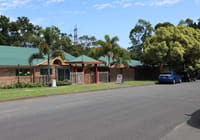
Build-to-Rent group snaps up $360 million twin-tower apartment project
Macquarie Bank-backed Build-to-Rent group Local Residential has turbocharged its portfolio, purchasing Golden Age’s $360 million twin-tower Box Hill apartment project.

The deal adds 425 apartments to the group’s 900-unit pipeline, which consists of projects in Kensington and South Melbourne.
Construction on SKY SQR – two 18-level towers designed by Fender Katsalidis – is due to start in early 2024.
Located 14 km from the Melbourne CBD, the site overlooks Vicinity’s Box Hill Central shopping centre, which contains a railway station and a bus hub. A tram terminates nearby on Whitehorse Road.
The sale is a coup for Golden Age managing director Jeff Xu, who purchased the 7344 square metre car park site at 517-521 Station Street, Box Hill, from the City of Whitehorse for about $51 million in 2016.
A forest of towers has emerged in Box Hill since then.
“We have spent considerable time exploring and researching the right direction for this project, to ensure it caters to the suburb’s ever-evolving needs. Box Hill is the perfect location for Build-to-Rent,” Xu said.
Golden Age will deliver the towers while retaining ownership and management of the 12,000 sq m hospitality precinct in the podium, which also has a childcare centre.
No sales campaign had started for the apartments, though leasing of its childcare centre and hospitality precinct is underway.
This is the first major BTR project outside of Melbourne’s inner-ring suburbs, and has pipped the sales campaign for the 332-unit mixed-use project Union Quarter, in Spotswood, in Melbourne’s inner-western suburbs.
Local Residential’s Matt Berg, who founded the company with Dan McLennan, said the group is due to become an operator next year, when its 477-unit Kensington project is completed. “That will be our first completed asset, and then we will become operational, not just a developer,” Berg said.
Local Residential’s South Melbourne project is due to be completed around the same time as Box Hill – late 2025. More projects are in the works. The group has another 2000 apartments in due diligence, he said.
“We tend to like the bigger projects. It’s more efficient to have larger buildings, and it’s more impactful,” Berg said.
The Box Hill project will include 37 apartments dedicated to “impact housing” – units allocated to essential workers, women over 55 and NDIS housing. “We’ve told our investors we wanted that to be about 10 per cent, but we really aspire for more than that,” Berg said.
Knight Frank research shows Melbourne accounts for about 45 per cent of BTR units in the pipeline, with 55,000 expected to be built in Australia by 2030.
While the sector is growing, it is still expected to represent just 1.5 per cent of the total rental supply.
Five projects offering 1370 units have already been completed this year. A further 5000 apartments in 13 projects are forecast for the next two years, according to research by Charter Keck Cramer.
However, Sydney is lagging well behind, with no projects completed this year and just eight developments and 1550 units in the pipeline. More competition for land and expensive land values, plus fractious planning issues, are holding back the sector.
All states are offering tax breaks to encourage the development and ownership of BTR projects, including land tax and foreign owner or vacant property charges.
However, research house Jarden reckons the returns are still challenging, with more support needed to make BTR projects financially stack up.
A recent research report suggested Australia should follow the UK and offer concessional long-term financing and fast-tracked approvals. Charter Keck Cramer also suggested an apartment viability fund, similar to an Irish scheme which helps kickstart the construction of BTR developments that are not financially viable in certain locations.









